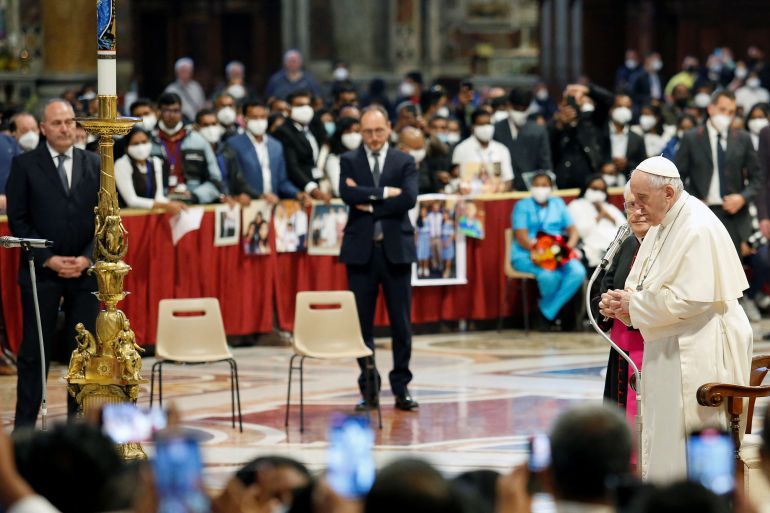Pope asks Sri Lanka to reveal identity of Easter Sunday attackers
Pope Francis urges the island nation to name the bombers behind series of attacks in 2019 that the Catholic Church suspects was a conspiracy.

Pope Francis has urged Sri Lankan authorities to reveal who was behind the country’s 2019 Easter Sunday bombings in an attack the island’s Catholics suspect was a plot to propel President Gotabaya Rajapaksa to power.
While meeting with a delegation of more than 60 victims of the attacks on three churches and three hotels that killed more than 270 people, Francis on Monday asked Rajapaksa’s administration to reveal the truth.
Keep reading
list of 4 itemsSri Lankan protesters demand justice for 2019 Easter bombings
‘Failed state’: Sri Lanka’s Buddhist leaders want gov’t to resign
Infographic: Sri Lanka’s economic crisis and political turmoil
“Please, out of love for justice, out of love for your people, let it be made clear once and for all who were responsible for these events,” the pope said in an appeal to Colombo.
“This will bring peace to your conscience and to your country.”
Addressing some 3,500 Sri Lankans in Italy, including some of the victims, the pope also said he prayed that Sri Lanka will also be able to ride out the worst economic crisis in its history.

The island is gripped by severe shortages of food, fuel and medicines with its 22 million residents grappling with daily electricity blackouts and galloping inflation.
The head of Sri Lanka’s Catholic Church, Malcolm Ranjith, who conducted mass at Saint Peter’s Basilica just before meeting with the pope on Monday, called for “justice and change” in his country.
“We want the international community to insist that, before giving any aid to Sri Lanka, that the government realise that they have to change the way things have been done,” he told Vatican Radio.
Cardinal Ranjith last month urged the United Nations Human Rights Council to set up a mechanism to probe the 2019 suicide bombings which Colombo had blamed on local Muslim groups.
“The first impression of this massacre was that it was purely the work of a few Islamic extremists,” Ranjith said.
“However, subsequent investigations indicate that this massacre was part of a grand political plot.”
The cardinal has suggested that the attacks helped Rajapaksa emerge as a “national security candidate” and win the November 2019 election.
Ranjith has accused Rajapaksa’s administration of shielding military intelligence operatives named in two separate local investigations which remain inconclusive.
Sri Lanka’s High Court in February acquitted two top officials accused of “crimes against humanity” for failing to prevent the Easter Sunday bombings.
Thilina Harshani, aged 38, from Negombo, survived the attack at the Katuwapitiya church but lost her seven-year-old son, was blinded in her left eye and was left paralysed from the waist down.
Harshani was a dancer and dance teacher before the explosion and she is now looking for truth, because “we want to know who did this and why we have to suffer so much,” she said.
Pradeep Susanta, 48, also from Negombo, lost his entire family in the attacks: three children and his wife.
“We want that the truth is revealed in the first place and then justice be meted out to the victims of the tragedy,” explained Bishop Winston Fernando, head of the Sri Lankan bishops’ conference.